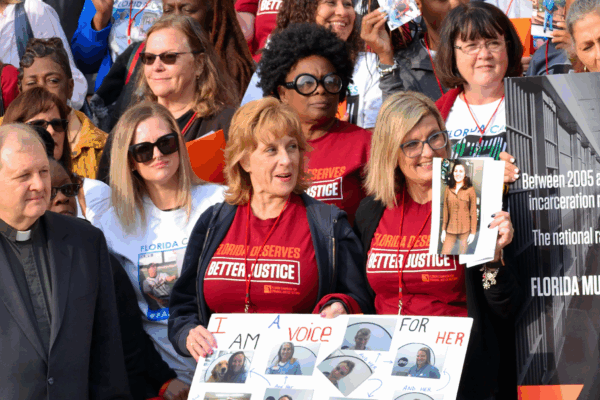The first week of March, I visited my daughter in the Florida Women’s Reception Center in Ocala. Our birthdays were coming up; she was turning 20 and I was turning 50. We shared ice cream sandwiches made into a sundae, topped with crushed Oreos bought from the prison concession, and celebrated our birthdays together. Little did we know there was a novel coronavirus insidiously emerging in our prisons and across the country. This virus has since changed our lives.
Covid in the Prisons
As of today, 2,591 incarcerated individuals in the state of Florida have tested positive for COVID, along with 827 staff. There have been 29 deaths of incarcerated individuals. Some of our loved ones are sick and others have passed away. Nationally, more than 50,000 prisoners have tested positive for the virus, with Florida being recognized as one of the hot spots.
For those who aren’t sick, they have been cut off from society whether infected or not, with no end date in sight. It is understandable that visitation is suspended due to the likelihood of visitors carrying the virus into prisons. Combine that with the risk already presented by staff, who go in and out every day, and the constant transfers into prisons from local jails, visitations would almost certainly result in many more positive tests.
As in the case of nursing homes, the virus can spread like wildfire in a prison. This is why loved ones of those incarcerated are begging the state, when possible, to set them free. You might ask, “Why is it better for them to be at home if the virus is spreading like wildfire outside too?” There are crucial reasons why.
The substandard healthcare system in prisons does not have the capacity or the financial resources to care for our loved ones falling ill from the virus. Prisons already struggle to treat ongoing health and mental health issues, such as the ongoing prisonwide Hepatitis C epidemic.
Let’s also mention the lack of a nutritious diet in prisons to fight off any ailments. Plus, incarcerated individuals can not social distance; they sleep two feet apart, as well as eat, live, use the bathroom, and work together in close proximity every day.
Do I blame the Department of Corrections for these conditions? No, I think they are working with prisons that are overcrowded due to draconian sentences levied in Florida. Corrections officials must also deal with budget limitations.
By the way, that money comes from you, the taxpayers. It would be used much better if, instead of warehousing prisoners, more of it were spent on rehabilitation. That leaves us in our current situation, where prisoners who don’t need to be incarcerated are in danger of succumbing to COVID-19. Some of our legislators continue to fail to acknowledge this.
The Toll on the Prisoners and Their Families/Loved Ones
The virus is taking an emotional toll on incarcerated individuals and the people who love them. Yes, they too, have families and loved ones. I have experienced nightmares and anxiety and many sleepless nights. My daughter is only 20. She needs her mom. She has had conversations with her bunkmates about taking care of each other should they fall ill, and now she is in a quarantined dorm.
Her mind is in a secluded place and gets into depressive states; she recently made a short visit to the psych unit. Memories of home have become a blur, a natural coping mechanism for those in prison. The longer the incarceration, the more society will become a distant memory.
She said to me recently, “Mom, it seems like I’m not going to see you until my end of sentence date.” That date is 4/21/24. I certainly hope that is not the case, but this virus is certainly not under control, at least not in Florida and some other states. Am I saying open visitation? No, not until this virus comes under control. Their chances of dying are much greater than that of society as a whole and they shouldn’t be given a death sentence.
Where do we go from here?
The need to decarcerate is apparent. End the imprisonment of low-level, non-violent imprisonment. The definition of violent needs to be revised as well. Did you know you can be convicted of a crime that labels you violent when no one was hurt and you didn’t
carry a weapon?
Also, we need to stop sending children to adult prisons! To be clear, NOT ALL prisoners are violent and some are serving 20, 30, 40 years to life for non-violent crimes. That is simply outrageous! Let’s free up the scarce resources for prisons so they can treat those inside and get a better handle on the virus and all infectious diseases and ailments.
We must also end the use of draconian mandatory minimum sentences, and end the revolving door of incarceration by incentivizing rehabilitation. The housing and the healthcare of prisoners with unnecessary and excessive sentences is costing you, the taxpayers, many millions of dollars every year. Incarcerated individuals are left without hope of earning credit for good behavior or engaging in self-improvement programs and vocational training.
Now, due to the coronavirus, their families are left to worry that their loved ones will die in prison from the virus--a death sentence they didn’t deserve.
Subsequently, the spread of the COVID-19 virus in prisons is taking its toll on all of us. Directly or indirectly, everyone is affected, including you.
Kim Lawrance is a mom of a daughter who was direct filed at the age of 15, and is inside living through the criminal justice system. Kim is a criminal justice advocate and also has her dual Master’s in criminal justice specializing in corrections and rehabilitation and criminal analysis and is a Criminal Justice PhD student.


